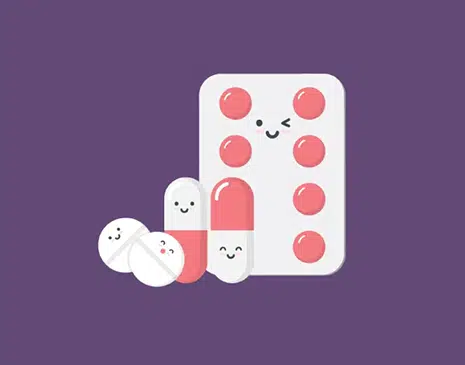You get an infection, and the doctor tells you to take antibiotics. But what if you’re on birth control—will the pill still work?
While some women have gotten pregnant while taking antibiotics and hormonal birth control at the same time, these reports are rare.
Can I get pregnant if I take antibiotics with the pill?
In most cases, no, as long as you continue to use your hormonal contraception as prescribed you are safe from pregnancy even if you are on antibiotics.
Theoretically, antibiotics might reduce your birth control’s efficacy by interrupting the recirculation of oestrogens in the body — a process called enterohepatic circulation. They do this by killing the bacteria in the small intestine that help break the hormone down and redistribute it within the body.
For these reasons, many manufacturers have historically placed warnings on antibiotic labels to inform women about this risk. Over the years, scientists have done many studies on various types of antibiotics’ effects on hormonal birth control to determine which ones you should and should not take at the same time.
It is a myth that all antibiotics will interfere with the efficacy of your birth control pill.
There is however, one class of antibiotics that is the exception: rifamycins, explained below.
Antibiotics That Can Affect Birth Control
Researchers have only found two types of antibiotics can affect the efficacy of your birth control:
- Rifampin: This medication is prescribed to treat tuberculosis. Rifampin causes the enzymes in your liver to break oestrogens down faster than normal, lowering those hormone levels in your body and possibly reducing your birth control’s efficacy. Some women might experience spotting between their periods while taking rifampin, but this doesn’t mean their birth control isn’t working.
- Rifabutin: Health care providers prescribe this medication to prevent an infection called mycobacterium avium complex in HIV patients, as well as to treat tuberculosis. It, too, reduces the levels of birth control hormones that suppress ovulation but to a lesser degree than rifampin.
Both of these medications belong to a class of antibiotics called rifamycins. Scientists have not been able to prove that any other rifamycins, however, affect birth control.
The bottom line
Drug interactions are complicated, so it’s always best to talk to your GP about all prescriptions, over-the-counter drugs, and supplements you’re taking before you start any new treatment or medication.
If you start taking medicine that makes your hormonal birth control less effective, you may need to add a backup method, such as condoms, sponges or spermicides to prevent pregnancy.
Aside from rifampin, most antibiotics shouldn’t affect whether your birth control works or not. However, more research is needed before we can be positive that different antibiotics don’t affect hormonal birth control at all. If you’re anxious about a medication affecting your birth control, using backup protection may be worth it just for the peace of mind.
This blog is designed to be informative and educational. It is not intended to provide specific medical advice or replace advice from your medical practitioner.













